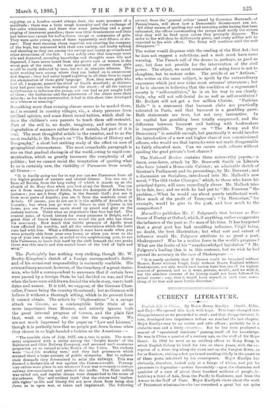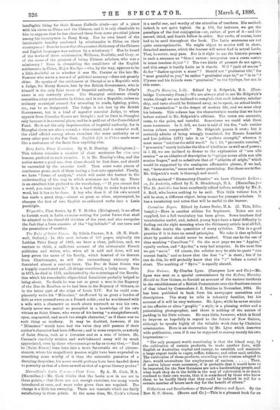CURRENT LITERATURE.
Englieh Life in China. By Major Henry Kuollys. (Smith, Elder, and Co.)—We opened this book with hope. This hope changed into disappointment as we proceeded to read ; and that disappointment, in turn, developed into impatience before we reached the last chapter. Major Knollys may be an active and able officer ; probably he is a clubable man and a lively raconteur. But he has here produced a marvel of " epauletted insolence" passing itself off for knowledge. He was in China a quarter of a century ago, on the staff of Sir Hope Grant. In 1882 he went as an artillery officer to Hong Kong, in which English Colony he lived for two or three years, with the ex- ception of a short trip along the coast end up the Yangtse River, as far as Hankow, visiting a few pelts and residing chiefly in the quarters of these ports inhabited by his countrymen. Major Knollys has obviously, therefore, looked only at a fringe of Chinn, and yet he presumes to dogmatise—nowise favourably—upon the character and qualities of a race of about three hundred millions of people, in- habiting a third of Asia, from the Pacific to Cashmere, and from the Amour to the Gulf of Siam. Major Knollys's views about the work of Protestant missionaries—he has conceived a great but not quite intelligible liking for their Roman Catholic rivals—are of a piece with his views on China and the Chinese, and it is only charitable to him to suppose that he has obtained them from some practical jokers among his countrymen in Hong Kong. Has be ever heard of the incalculable benefits conferred by missionaries in China on their countrymen ? Does he know that the greatest dictionary of the Chinese and English languages was written by a missionary ? Has he heard of the works of three missionaries, Williams, Doolittle, and Gray, or of the name of the greatest of living Chinese scholars, who was a missionary ? Even in chronicling the small-beer of the English settlements in China, Major Knullys—who, by the way, appears to be a little doubtful as to whether it was Mr. Forster or the late Mr. Fawcett who wrote a manual of political economy—does not greatly shine. He speaks of the settlement at Shanghai as a Republic with a Judge, Sir Henry Rennie, lent by the British Government, who in himself is the only faint trace of Imperial authority. The Judge's name is not correctly given. The Shanghai settlement closely resembles other settlements is China, and is not a Republic, unless an ordinary municipal council for attending to roads, lighting, police, &c., can be so designated. The Judge is not lent by the British Government, but is a kind of superior consular Judge, to whom appeals from Consular Courts are brought; and be lives in Shanghai only because it is a central place, and he is paid out of the Consolidated Fund. He is not the only impersonation of imperial authority, for in Shanghai there are also a consul, a vice consul, and a consular staff, the chief official among whom exercises the same authority as at every other port in the Far East. English Life in China reads more like a caricature of the facts than anything else.



































 Previous page
Previous page